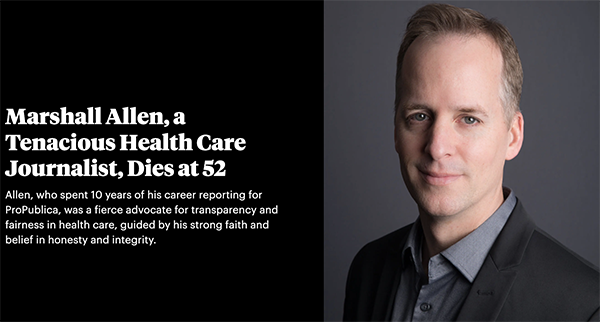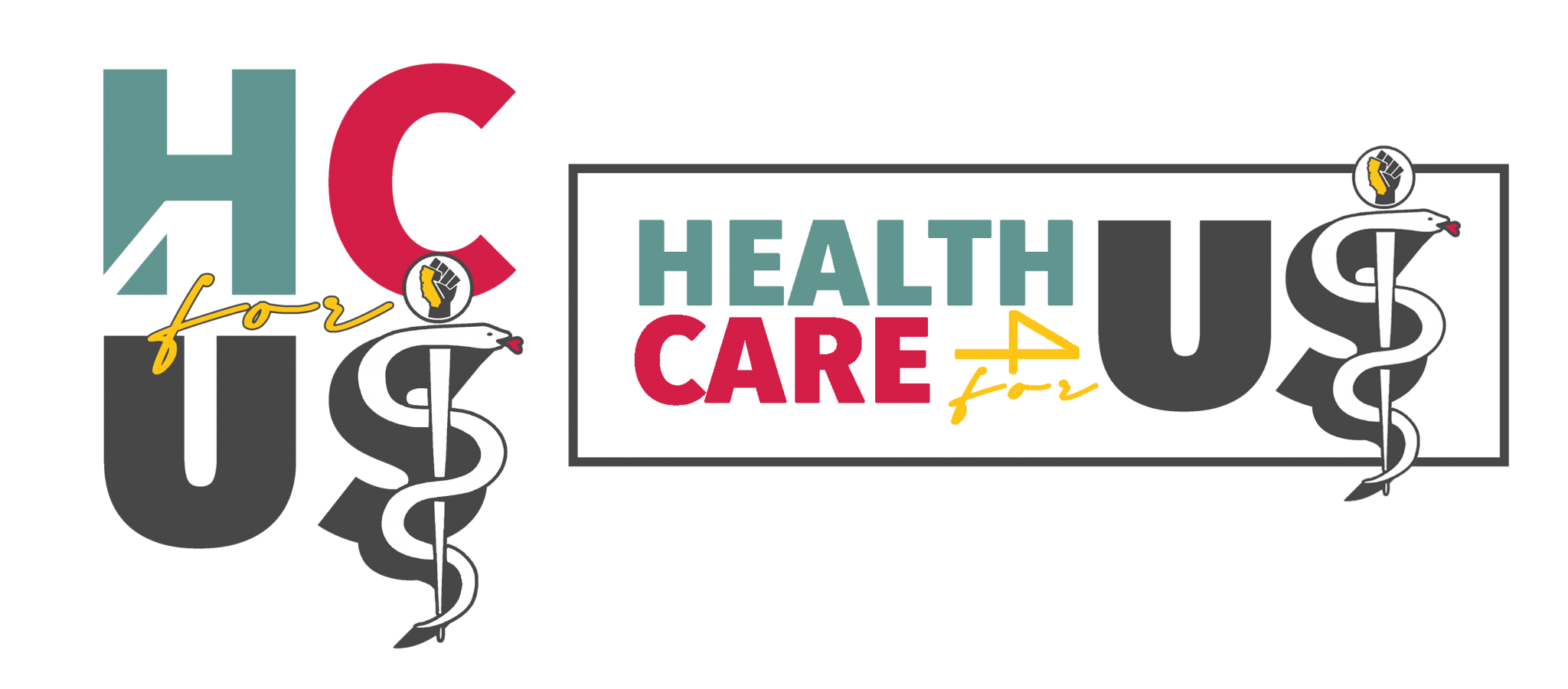Marshall Allen, a Tenacious Health Care Journalist, Dies at 52
by Michael Grabell
May 21, 2024
 Marshall Allen, a former ProPublica investigative reporter who relentlessly took on the U.S. health care system and fought for the rights of patients facing unfair medical bills, died Sunday at a hospital in the Dallas-Fort Worth area. He was 52.
Marshall Allen, a former ProPublica investigative reporter who relentlessly took on the U.S. health care system and fought for the rights of patients facing unfair medical bills, died Sunday at a hospital in the Dallas-Fort Worth area. He was 52.
The cause was a heart attack, said Sonja Allen, his wife of 29 years.
Guided by his Christian faith, Allen approached his stories with the moral conviction that doctors, hospitals, drugmakers and health insurers could be less wasteful and more transparent and humane. His stories showed that drug companies purposely made eyedrops too big and set unnecessarily short expiration dates for drugs that were still effective and safe, leading to waste and driving up costs.
With other reporters, he analyzed millions of Medicare records to create “Surgeon Scorecard,” a ProPublica database that allowed patients to see for the first time the death and complication rates of surgeons performing common procedures like knee replacements and gallbladder removals. In another story, he showed how a hospital system refused to cover the care of an employee’s premature baby, leaving her with a bill for $898,984.57. Within days of Allen calling the system’s media representative, it promised to cover the bill.
“He would be our tour guide to things that were incredibly enraging,” said Tracy Weber, a ProPublica managing editor who worked with Allen. “He would walk us through it, and then he’d show us how it didn’t have to be that way.”
Allen’s journalism won numerous honors. A series of stories he did on patient safety in Las Vegas hospitals while at the Las Vegas Sun won the Goldsmith Prize for Investigative Reporting and was a finalist for the Pulitzer Prize in 2011. He was one of the first people at ProPublica to volunteer to cover the COVID-19 pandemic and was a member of the team that was a finalist for the Pulitzer in public service in 2021. That year, Allen also published a book, “Never Pay the First Bill: And Other Ways to Fight the Health Care System and Win,” which showed consumers how to advocate for themselves.
More than the honors, his stories exposing medical scams, waste in the health care system and hidden incentives in the insurance industry steadily achieved impact and motivated people in power to make changes.
“Marshall had this curiosity about the health care system that allowed him to explore stories with a freshness that many veteran health care reporters can’t do,” said Charles Ornstein, a ProPublica managing editor and longtime health journalist.
That curiosity led him to receive an award as one of America’s “Top Doctors,” despite having no medical credentials. Rather than ignoring a voice message from a telemarketer, calling about his “Top Doctor” award, Allen decided to inquire, exposing the absurdity of the accolades in the process.
After he explained that he was actually a journalist, not a doctor, he asked if he could still receive the award. Indeed, he could — for a “reduced rate” of $289.
Allen came to journalism through his work as a Christian missionary. After graduating from the University of Colorado Boulder with an English degree, he spent five years as an evangelical minister, including three in Kenya, and earned a master’s degree in theology at Fuller Theological Seminary in California.
While he and his wife were in Kenya, he started writing newsletters and reports to his family about their experiences, Sonja Allen said. “He just came to life when he started to write,” she said. “I would say the No. 1 thing that motivated his work was his belief in the Bible, of standing up for what’s right.”
But not all editors saw it that way. In an interview for one of his first journalism jobs, a hard-nosed editor questioned Allen about how his faith background would prepare him for reporting.
“I explained what I saw as a natural progression from the ministry to muckraking, pointing out that both are valid ways of serving a higher cause,” Allen wrote in a 2018 essay that was copublished in The New York Times. “The Bible endorses telling the truth, without bias. So does journalism. The Bible commands honesty and integrity. In journalism, your reputation is your main calling card with sources and readers.”
After a few years working for community newspapers in Southern California, he joined the Las Vegas Sun. There, his editor asked him to cover health care.
“Marshall’s exact words were, ‘I couldn’t imagine anything more boring than health care,’” Sonja Allen said.
But he soon discovered an endlessly intriguing and infuriating beat, challenging what many people accepted as just the way it is. The opening to the series that won the Goldsmith began, “There’s a running joke about hospitals here: ‘Where do you go for great health care in Las Vegas?’ ‘The airport.’ The implication is everyone knows hospital care in Southern Nevada is substandard.”
Allen and his colleague showed that health care insiders had access to information that the public didn’t. Analyzing records on preventable infections and injuries, they provided consumers with quality-of-care data that allowed them to make better decisions and led to new state laws.
In 2011, Allen was hired by ProPublica, where he began to dig into surgical complications.
“Everybody told Marshall that this was impossible, that you could never do this, that you could never do this right, that you should leave this to the pros,” Ornstein said. “And, of course, Marshall was completely undaunted by this challenge.”
Farley Chase, Allen’s literary agent, described him in almost identical terms: “He was insulted by the inscrutability of the health care system but had this kind of like just roll-up-your-sleeves, undaunted-by-any-kind-of-challenge attitude.”
In addition to his steadfastness, Allen was known in the newsroom for his…
[READ THE COMPLETE ARTICLE HERE]

